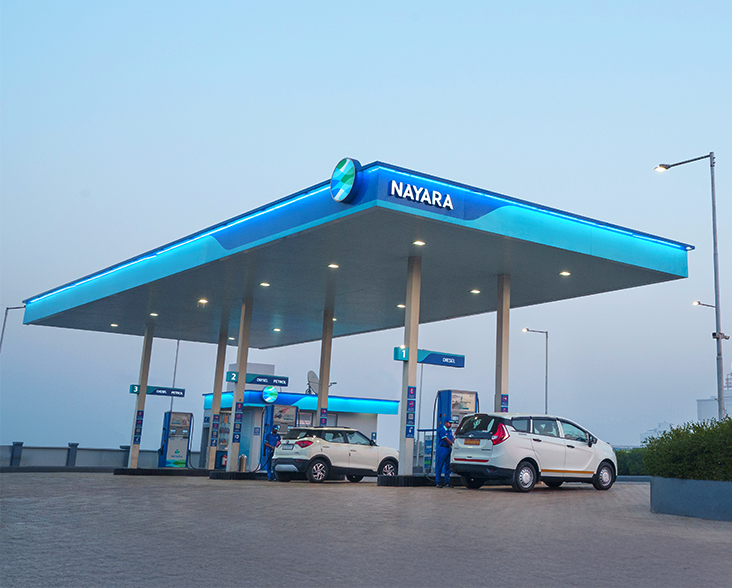Decoding Your Car's Warning Lights: A Handy Guide and Nayara Energy's Proactive Approach
Imagine this: you’re cruising down the highway, music playing, when suddenly, a light pops up on your dashboard. Panic mode sets in. What does it mean? Should you pull over immediately? Is your car about to break down?
Car warning lights are like your car’s way of communicating with you. Think of them as little messages from your vehicle, letting you know something needs attention. Ignoring them can lead to bigger, costlier problems. But don’t worry, we’ve got your back! In this guide, we’ll decode the most common car warning lights so you know exactly what to do when one of them starts glowing.
Check Engine Lights: Your Car’s First Health Signal
What Does an Engine Light Mean?
The check engine lights is one of the most feared yet misunderstood dashboard indicators. Located on your instrument panel, this little light—often shaped like an engine, can mean a variety of things. It might be something minor like a loose gas cap or something more serious like a failing catalytic converter.
So why is it on or blinking? If it’s steady, it usually means there’s an issue that needs attention, but you can keep driving. Blinking check engine lights, however, mean a serious problem that requires immediate action like a misfiring engine that could lead to expensive damage.
Nayara Energy's Proactive Approach
Here’s the good news: many check engine lights issues stem from poor fuel quality and carbon buildup in your engine. Nayara Energy takes a proactive approach by offering fuel with special additives that help keep your engine clean and running efficiently. With cleaner fuel, your car experiences fewer issues, and that pesky engine light stays off longer.
By using high-quality fuel from Nayara Energy, you not only enhance your car’s performance but also extend the lifespan of critical engine components. These additives help prevent deposit buildup in fuel injectors and combustion chambers, ensuring a smoother ride.
Moreover, Nayara Energy provides advanced diagnostic tools at select fuel stations, allowing you to check and understand why your check engine lights may be on without visiting a mechanic immediately. Taking timely action can help you avoid costly repairs and unexpected breakdowns.
Oil Pressure Warning: Taking Care of Your Engine
The Importance of Oil Pressure
Your car’s engine needs proper lubrication to function smoothly. When the oil pressure warning light appears, it means the engine isn’t getting enough oil pressure, which can lead to overheating and severe damage.
Low oil levels or a failing oil pump are common causes of this warning. Regularly checking your oil levels and topping them up when needed can save you from expensive repairs. If this light comes on, don’t ignore it- pull over, check your oil level, and if necessary, get professional help.
Oil acts as the lifeblood of your engine, reducing friction between moving parts. Without it, heat buildup can cause irreversible damage, leading to costly repairs or even complete engine failure. Experts recommend changing your oil at regular intervals and using high-quality motor oil to keep your engine running efficiently.
Additionally, keeping an eye on your oil pressure warning light can help detect issues with oil leaks or worn-out seals before they become bigger problems. It’s always a good idea to schedule routine maintenance checks to ensure your engine is in top shape.
Battery Light: A Sign of Power Issues
What Does the Battery Light Indicate?
The battery light isn’t just about your car’s battery, it could also signal issues with your alternator. If this light appears, your car’s electrical system isn’t charging properly. This could mean your battery is dying, the alternator is failing, or there’s corrosion on the battery terminals.
Before rushing to a mechanic, check for loose connections or corrosion on the battery terminals. If they look clean and tight but the battery light is still on, it’s time to get your charging system inspected.
Car batteries have a limited lifespan, typically around 3-5 years. If your battery light is on and your car struggles to start, it may be time for a replacement. Modern vehicles rely heavily on electrical components, making a healthy battery crucial for smooth operation.
Regularly checking your battery terminals for corrosion and ensuring they are tightly connected can help avoid unexpected breakdowns. If your car is slow to start or you notice flickering headlights, these could be early signs of a failing battery.
Tyre Pressure Monitoring System (TPMS) Light: Tyre Pressure Matters for Safety
Why Tyre Pressure is Important?
Low tyre pressure doesn’t just make driving uncomfortable; it can reduce fuel efficiency, increase tyre wear, and compromise your safety by affecting handling and braking performance. If the tyre pressure monitoring system (TPMS) light appears, it means at least one of your tyres is underinflated.
Nayara Energy's Tyre Care Services
Nayara Energy petrol pumps make it easier to maintain proper tyre pressure by providing air pumps at their fuel stations. Regularly checking and inflating your tyres can improve your car’s performance, fuel economy, and safety.
Ensuring correct tyre pressure also helps extend the lifespan of your tyres, saving you money in the long run. Underinflated tyres create excess friction and heat, leading to premature wear and a higher risk of blowouts.
ABS Warning Light: Checking Your Braking System’s Safety
What Does the ABS Warning Light Mean?
The ABS warning light is linked to your car’s anti-lock braking system. If it comes on, it means the system is disabled due to an issue with the ABS sensors or brake fluid levels. While your brakes will still work, they won’t prevent wheel lockup in emergency situations, making driving riskier on slippery roads.
If the ABS warning light stays on, get your braking system checked as soon as possible to avoid compromising your safety. Faulty sensors, worn brake pads, or low brake fluid levels can all trigger the ABS light, signalling a need for immediate attention.
Your braking system is one of the most critical safety features of your car. Regular brake inspections, timely pad replacements, and ensuring your brake fluid is at the correct level can keep your ABS functioning properly. Ignoring this warning could lead to compromised braking efficiency, putting you at greater risk on the road.
Understanding your car warning lights can save you from costly repairs and dangerous situations. Whether it’s the check engine lights, oil pressure warning light, or the tyre pressure monitoring system, each warning tells you something important about your vehicle’s health.
With Nayara Energy’s commitment to better fuel quality and convenient tyre pressure services, you can proactively maintain your car’s performance and safety. The next time a warning light pops up, you’ll know exactly what to do!
By taking timely action and using high-quality services like those provided by Nayara Energy, you ensure a smoother, safer, and more efficient driving experience. Keep your car in top shape, and drive with confidence!




